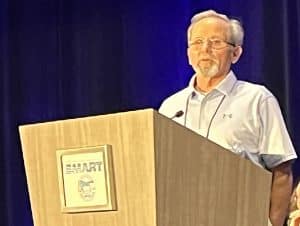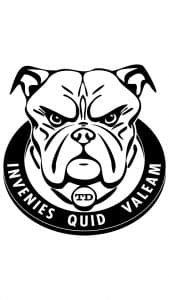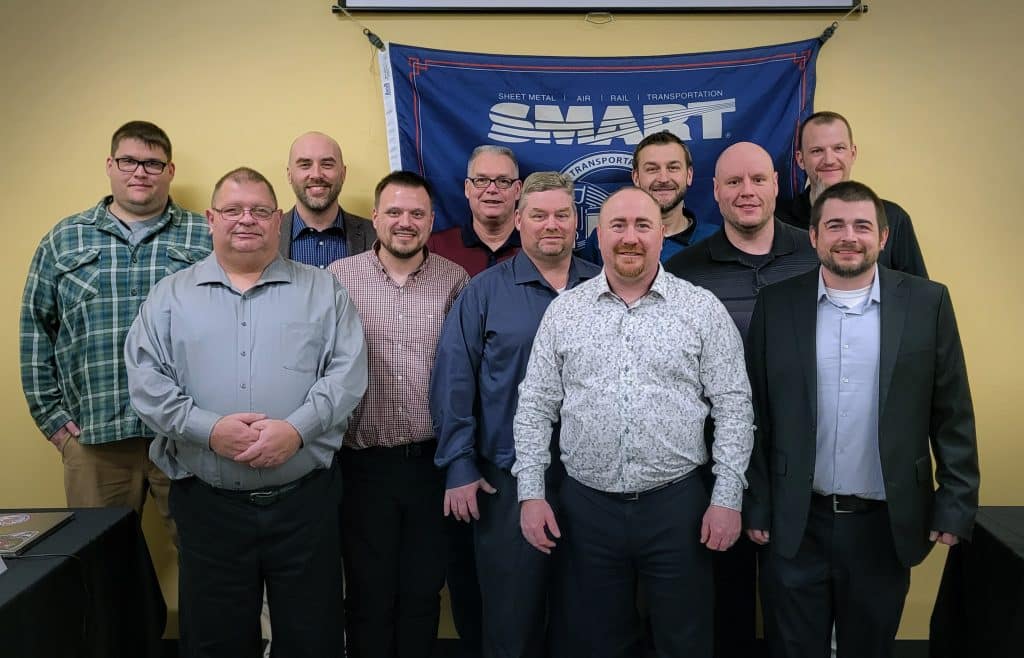CLEVELAND — The closing session of the SMART Transportation Division 2024 National Training Seminar recapped significant safety advancements driven by our railroad members over the last year.
The key to continuing those improvements is sharing safety concerns at every level. Several examples were presented at the seminar.
Officers in Minnesota won hours of service cap for yardmasters
TD President Jeremy Ferguson recognized Minnesota State Legislative Director Nick Katich who, along with Alternate Vice President Christopher Bartz, pushed legislation to create hours-of-service limitations for yardmasters in the state.
Passed in May 2024, Minnesota became the first state to protect yardmasters from excessive fatigue and overwork. After listening to their members, and with evidence in hand, they were able to make a positive change. Their shifts in the tower are now capped at 12 hours.
“They were successful, and I want to thank them for a job well done in getting hours of service protections for our yardmasters,” Ferguson said.
The push for federal protection for yardmasters continues in Washington, D.C.
Railroad union and FRA continue working for C3RS
SMART-TD officers also were instrumental in getting a pilot program for the Confidential Close Call Reporting System (C3RS) together on three Norfolk Southern properties — the first time in recent years that a Class I has committed to anonymous safety reporting.
After the East Palestine, Ohio, rail disaster, the Association of American Railroads committed its member railroads to take part in C3RS. Already routine for aviation workers, the anonymous reporting system is independently administered by NASA.
“They said they were in,” Alt. National Legislative Director Jared Cassity said, but the carriers balked during discussions with the FRA’s Railroad Safety Advisory Committee (RSAC). They wanted to keep the ability to punish their employees.
“So, we’ve not made a lot of headway,” Cassity said. “I am not going to stop our fight to pursue C3RS on Class Is across the country, and for every railroader, because the reality of it is the data’s there.”
Norfolk Southern’s pilot and BNSF, with its dispatchers and signal maintainers, are the two exceptions.
C3RS has been established on 31 freight and transit operations nationwide, with about one-third of those properties with SMART-TD representation. Passenger rail properties such as SEPTA, Metro North, MBTA and Amtrak, and a smattering of short lines are among the participants. As a result, those SMART-TD members can anonymously report incidents that could have resulted in an accident.
“It works in the aviation industry. They’ve had it for more than 40 years. We’ve had it for 20 years,” Cassity said. “It’s a proven product.”
Local union officers learn how to bring C3RS to their property
Rob Castiglione, staff director of safety partnerships and Liz Gross, legal counsel from the Federal Railroad Administration, outlined how to get a freight or passenger carrier to take part in C3RS.

First, the local chairperson on smaller properties or general chairpersons on larger properties must reach a memorandum of understanding with carrier management. It’s not difficult, as FRA and labor set up a template in 2003.
“It’s important to get FRA involved early,” stressed Castiglione, who once served as an FRA inspector. “Once you start having conversations about what an agreement or an IMOU (initial memorandum of understanding) looks like, get us involved. We are a stakeholder — this is a tri-party agreement between labor, railroads and the FRA.”
Next, encourage union members to use the system. Unless people on properties with the program make reports, it won’t be useful.
“We can’t promote this program all by ourselves,” Castiglione said. “This program does not succeed if members do not participate. It really starts at the grassroots level with your local chairpersons. Some of those folks who work side by side — the engineers and conductors talk about this program and how it works.”
Finally, provide all the details in those reports. Sometimes it’s a struggle to collect usable information due to railroaders’ guarded nature, he said.
“Too often we get reports that lack sufficient detail for the peer review team to understand what the hell happened,” Castiglione said.
But NASA, which has handled close to 2 million reports since the program began, eliminates any personally identifiable details from the reports. Workers shouldn’t be wary of taking part.
“Never once has NASA breached confidentiality for either the carrier or the worker,” Castiglione said.
The safety benefits are well-documented. C3RS has resulted in 19 safety alerts, nine notices to industry at large and 90 immediate alerts to individual carriers.
Properties who take part see marked improvements in safety with no risk to those who take part — a more than 25 percent improvement in incidents from years before.
“Close-call reports will never put people in a worse place,” Gross said.
C3RS and related links
FRA C3RS home page: https://railroads.dot.gov/railroad-safety/divisions/safety-partnerships/c3rs/confidential-close-call-reporting-system-c3rs
Volpe Center Lessons Learned: https://www.volpe.dot.gov/featured-report/confidential-close-call-reporting-system-c3rs-lessons-learned-evaluation-final
NASA C3RS page: https://c3rs.arc.nasa.gov/
NASA C3RS database search tool: https://c3rs.arc.nasa.gov/products.html

